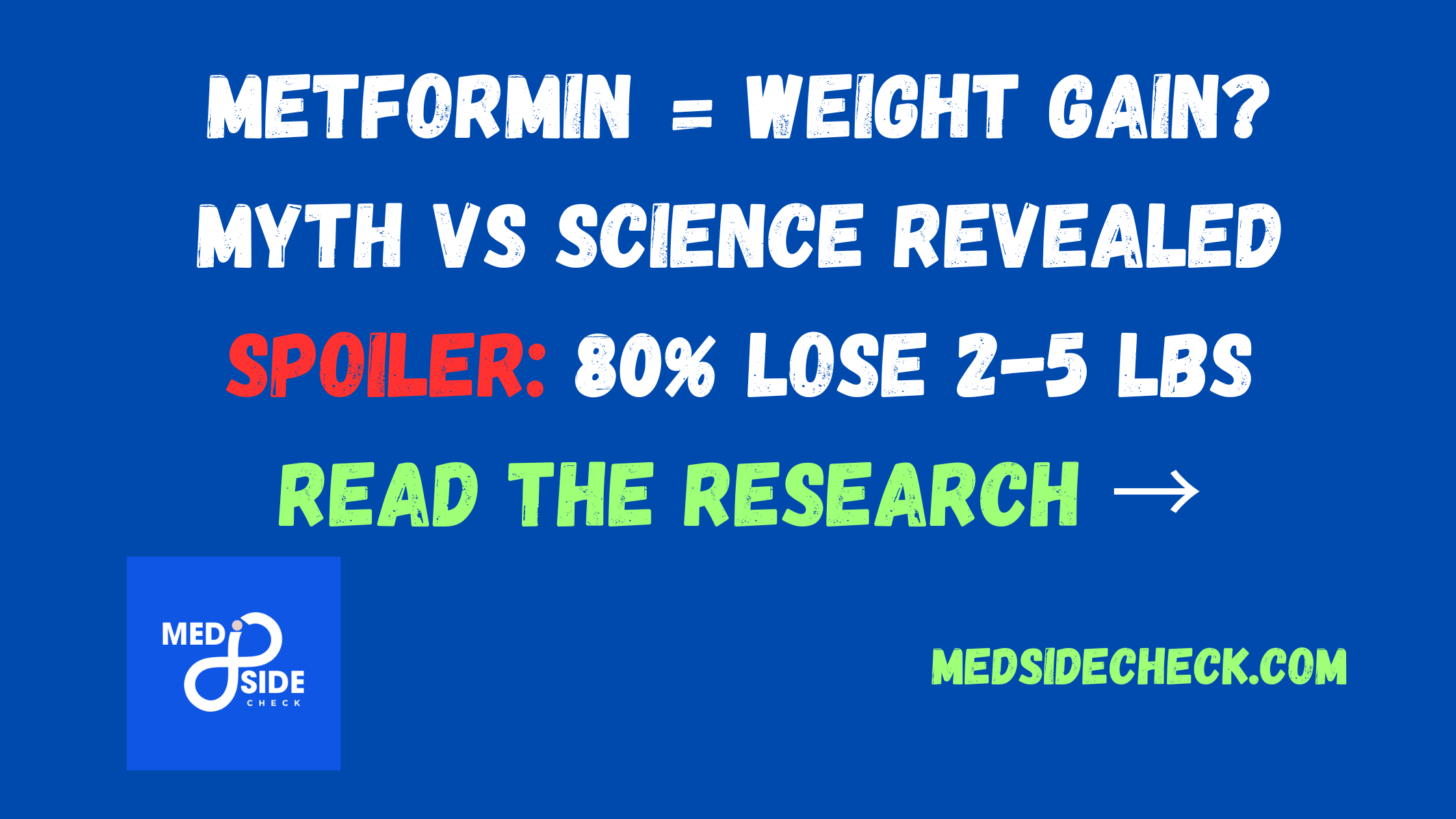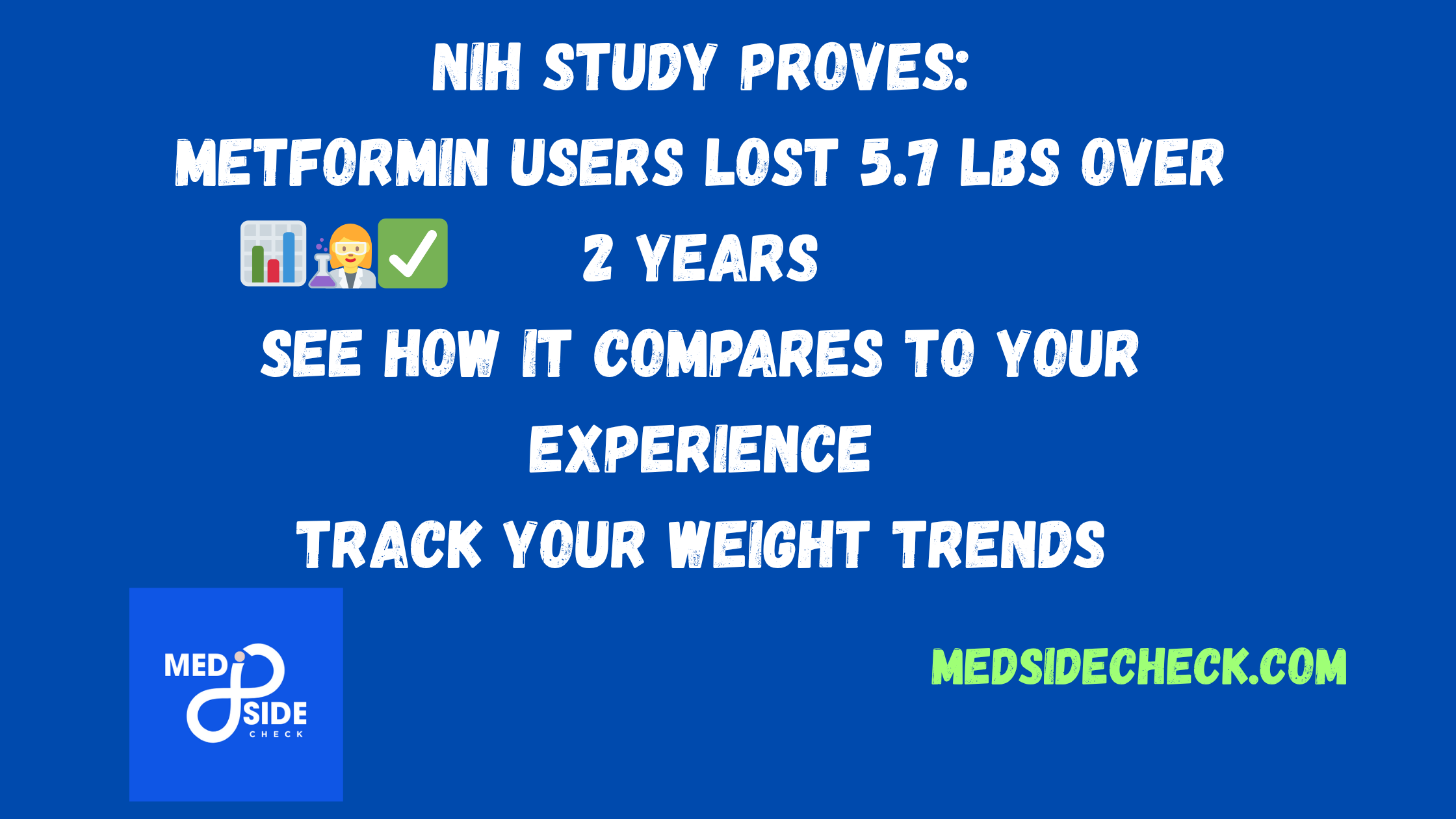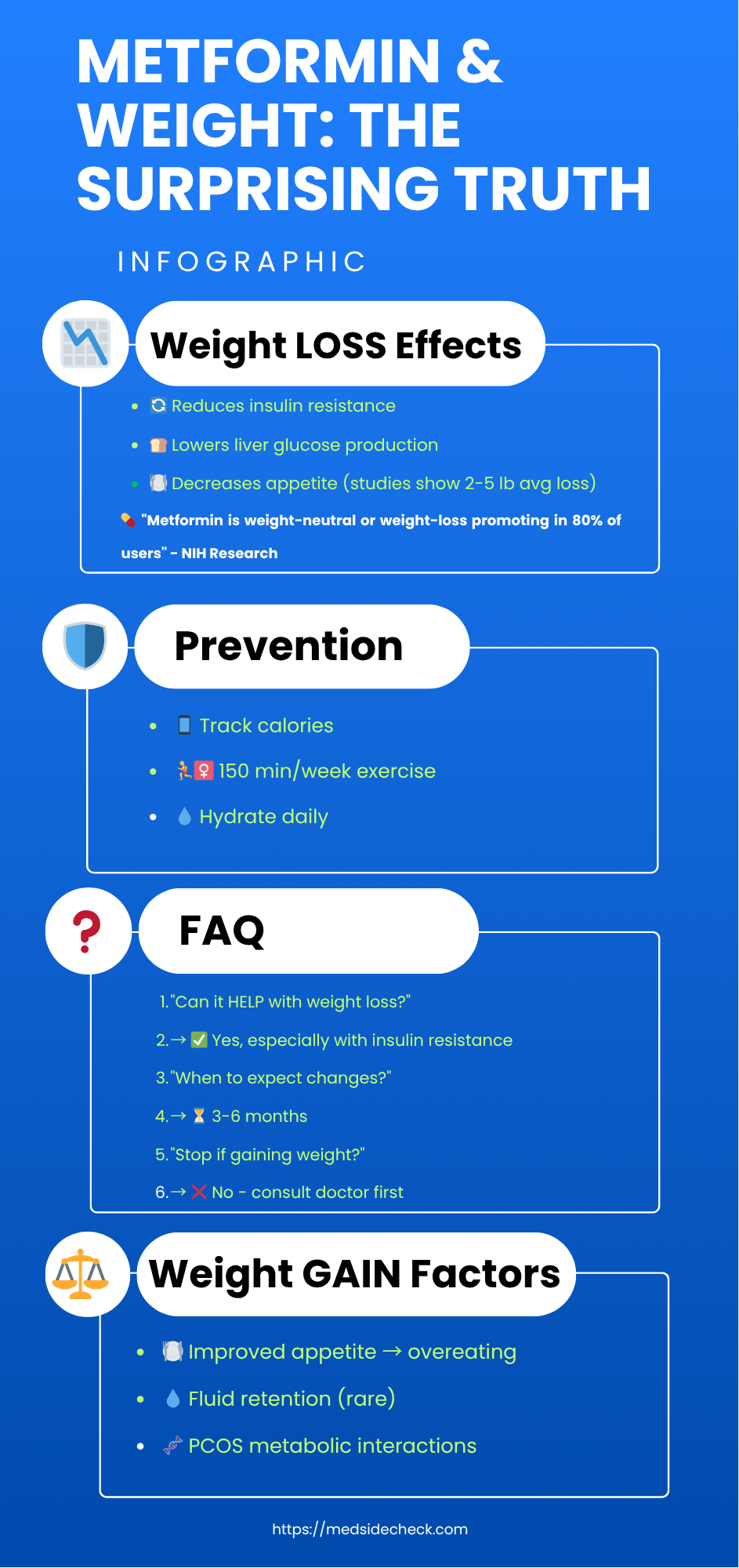Metformin and Weight: Does It Help You Lose or Gain Weight?

Introduction: Understanding Metformin and Its Role in Health
Metformin is one of the most widely prescribed medications for managing type 2 diabetes and polycystic ovary syndrome (PCOS). As its popularity grows, so do the questions surrounding its effects on the body—especially regarding weight. A common concern patients ask is, "does metformin cause weight gain"? Others wonder, "can metformin make you gain weight"? These questions highlight growing interest in how this medication interacts with metabolism. Beyond its traditional use, people are now also exploring metformin for weight loss, asking about metformin cost, and considering metformin for longevity as part of a healthy aging strategy.
Despite being a glucose-lowering drug, many still ask, does metformin cause weight gain? Clinical studies often show the opposite—many patients report modest weight reduction, which is why interest in metformin for weight loss has surged. Yet, because every body responds differently, some continue to question, can metformin make you gain weight? These discussions go hand-in-hand with rising curiosity about the affordability of the drug, prompting frequent searches for metformin cost. At the same time, science is beginning to uncover potential benefits of metformin for longevity, linking it to improved lifespan and healthier aging in certain populations.

If you’ve been prescribed metformin or are considering it, it's normal to ask: does metformin cause weight gain? Understanding both the benefits and side effects is crucial. Similarly, the idea that can metformin make you gain weight continues to circulate, despite limited evidence. On the flip side, many are using metformin for weight loss under medical supervision. Whether you're managing insulin resistance, looking into metformin for longevity, or simply trying to calculate your metformin cost, this guide will help you sort fact from fiction. Stay tuned as we unpack everything from its mechanism to pricing.
Does Metformin Cause Weight Gain or Weight Loss?
Many people wonder, can metformin cause weight gain or does metformin cause you to gain weight? This is a common concern, especially among individuals newly prescribed metformin for type 2 diabetes or PCOS. However, clinical studies have consistently shown that metformin and weight loss often go hand in hand. Unlike other medications that may increase appetite or lead to fat storage, metformin tends to work by improving insulin sensitivity and reducing glucose production in the liver — mechanisms that generally support weight reduction rather than gain. While some anecdotal cases suggest minimal weight changes, the majority of scientific research does not support the idea that metformin causes weight gain.

In fact, for many users, metformin and weight loss is a well-documented benefit. The medication can slightly suppress appetite and enhance fat metabolism, which helps patients lose or maintain weight. So, does metformin cause you to gain weight? Most evidence points to the contrary. The perception that metformin can make you gain weight may stem from other factors such as poor diet, underlying medical conditions, or concurrent medications. If you're asking, can metformin cause weight gain, it's important to know that such cases are rare and often misunderstood.
The myth that metformin can make you gain weight continues to circulate online, but it's not backed by science. Instead, metformin and weight loss is one of the reasons it's sometimes prescribed off-label for conditions like PCOS or prediabetes. Still, because every individual reacts differently, patients might notice variations. But on the whole, if you're worried and asking can metformin cause weight gain or does metformin cause you to gain weight, rest assured that the likelihood is very low. In most cases, metformin and weight loss are the more accurate pairing, not weight gain.
Metformin for Weight Loss: Is It Effective?
Many people turn to metformin weight loss strategies when struggling with obesity linked to insulin resistance or PCOS. The reason metformin weight loss works for some individuals lies in its ability to improve how the body uses insulin. By lowering insulin levels and reducing sugar production in the liver, metformin and weight loss effects become noticeable, especially in those who also adopt healthier diets. Additionally, the drug can suppress appetite in some users, contributing further to metformin weight loss benefits.

Clinical studies have shown a consistent connection between metformin and weight loss, especially in people with prediabetes or metabolic syndrome. One notable trial found that participants taking metformin ER 500 mg lost more weight over a year compared to those on placebo. The slow-release design of metformin ER 500 mg helps maintain steady blood sugar and minimizes side effects, which may support better adherence and success in metformin weight loss efforts. Doctors often prescribe metformin ER 500 mg to improve outcomes for long-term users.
When comparing metformin ER 500 mg with the standard formulation, the extended-release option is often preferred for smoother glucose control and reduced nausea. While both can support metformin and weight loss, the ER version is tolerated better, which may lead to improved consistency and results. Those struggling with appetite or insulin imbalance may benefit from choosing metformin ER 500 mg as part of their metformin weight loss regimen. Overall, metformin and weight loss continue to show promise in controlled medical settings.

IV. Metformin for PCOS and Prediabetes: Dual Benefits
Metformin for PCOS has become a widely prescribed option to help women manage irregular menstrual cycles, hormonal imbalance, and insulin resistance. Many women with PCOS struggle with weight gain and infertility, and metformin for PCOS helps improve insulin sensitivity, making weight loss more achievable. Additionally, metformin for PCOS can lower androgen levels, which often cause acne and excess hair growth. With consistent use, metformin for PCOS has shown to regulate ovulation and promote more regular menstrual cycles. Doctors often recommend metformin for PCOS alongside lifestyle changes for maximum benefit. As a non-hormonal treatment option, metformin for PCOS appeals to many women looking for natural ways to manage symptoms. The growing success stories surrounding metformin for PCOS reflect its long-term role in women's health management.
Similarly, metformin for prediabetes is gaining recognition for its ability to prevent or delay the onset of type 2 diabetes. By enhancing insulin efficiency and reducing hepatic glucose production, metformin for prediabetes serves as an early intervention strategy, especially in individuals with high-risk factors like obesity or family history. Studies show that patients using metformin for prediabetes can experience modest weight loss, which further improves glucose control. Healthcare providers often recommend metformin for prediabetes alongside diet and exercise for comprehensive risk reduction. Since it is generally well tolerated, metformin for prediabetes is a valuable tool for long-term blood sugar regulation. In clinical settings, metformin for prediabetes has been shown to reduce the risk of progressing to full-blown diabetes by up to 31%. More people are now turning to metformin for prediabetes as a preventive measure to avoid complications later in life.
There’s growing interest in metformin for longevity, thanks to studies suggesting it may help reduce age-related diseases. Initially designed for diabetes, metformin for longevity is being explored for its potential to extend life span by improving metabolic health. Researchers believe metformin for longevity works by activating cellular pathways that mimic the effects of calorie restriction, known to support healthy aging. In animal studies and observational human data, metformin for longevity has been linked to lower rates of cancer and cardiovascular disease. Although not yet approved for anti-aging purposes, off-label use of metformin for longevity is on the rise. People considering metformin for longevity should consult their doctor, especially if they’re already using it for conditions like metformin for PCOS or metformin for prediabetes. Ongoing trials will help determine how safe and effective metformin for longevity truly is for the general population.

V. Metformin Types and Dosage: Understanding Your Prescription
When you’re prescribed metformin, it’s important to understand the differences between various forms such as metformin HCL ER 500 mg and metformin ER 500 mg. Both are extended-release versions designed to release the drug slowly over time, which helps reduce common side effects like nausea and stomach discomfort. However, while metformin HCL ER 500 mg is a hydrochloride-based formulation, metformin ER 500 mg is often used more generically to refer to the extended-release tablet. Your doctor may choose metformin HCL ER 500 mg or metformin ER 500 mg depending on your medical condition, tolerance, and treatment goals.
One key factor to consider is how dosage affects both the effectiveness and side effects of the medication. People often start with metformin HCL ER 500 mg or metformin ER 500 mg once daily and gradually increase as tolerated. A steady, slow-release from metformin HCL ER 500 mg helps minimize spikes in blood glucose while possibly supporting weight stability or even weight loss. Similarly, metformin ER 500 mg can be better tolerated in people who experienced issues with immediate-release versions. Choosing between metformin ER 500 mg and metformin HCL ER 500 mg may influence how your body responds, especially in terms of gastrointestinal comfort and metabolic outcomes.
Whether you're taking metformin ER 500 mg or metformin HCL ER 500 mg, it’s crucial to follow your healthcare provider's instructions and monitor your response closely. Some individuals may see a reduction in appetite or weight loss, while others might need adjustments to avoid any minor weight gain. Remember, consistent use of metformin HCL ER 500 mg or metformin ER 500 mg not only helps with blood sugar management but can also play a role in supporting broader metabolic health when used correctly.
VI. How Much Does Metformin Cost? Is It Affordable?
The metformin price can vary widely depending on the pharmacy, dosage, and brand. For those prescribed the common metformin 500 mg dose, the metformin 500 mg price tends to be quite affordable, especially for the generic version. Patients often search online for the best metformin price deals, and it's not uncommon to find competitive metformin 500 mg price listings at discount pharmacies. While brand-name versions might be more expensive, most people opt for generics to reduce their metformin price burden. If you're comparing your options, always look at both the brand and generic metformin 500 mg price. Many patients are surprised to see just how low the metformin price can go with the right source.
For those exploring metformin for sale online, it's crucial to prioritize safety. While there are many sites that advertise metformin for sale, not all are licensed or reputable. It's essential to verify that the online pharmacy is certified and legally authorized to dispense prescription medications. Though finding metformin for sale at a lower cost may seem attractive, safety should never be compromised. Consumers looking for affordable metformin for sale should check for verified digital health platforms or government programs. Remember, even a low metformin 500 mg price isn’t worth it if the product’s source is untrustworthy. Always compare both metformin price and quality before making a purchase. The peace of mind is worth the effort when seeking metformin for sale.

An alternative to traditional metformin is Trijardy XR, a combination medication that includes metformin along with other antidiabetic agents. While Trijardy XR offers added benefits for blood sugar control, it often comes at a higher cost than the average metformin price. Patients interested in advanced therapy should compare Trijardy XR pricing with the typical metformin 500 mg price to determine the best fit. Though the Trijardy XR cost may be higher, some may find it beneficial for convenience and effectiveness. It's also worth noting that Trijardy XR is not always available in every pharmacy, unlike common metformin for sale listings. Before switching, patients should discuss both Trijardy XR and the regular metformin price options with their healthcare provider. Choosing between Trijardy XR and standard metformin comes down to balancing budget and treatment goals.
Trijardy XR vs Metformin: What’s the Difference?
Trijardy XR is a newer combination medication designed to treat Type 2 diabetes more efficiently by combining three active ingredients: empagliflozin, linagliptin, and metformin. Unlike standalone metformin, Trijardy offers a multi-targeted approach to blood sugar management by addressing glucose control from different pathways. This makes Trijardy a convenient once-daily pill that may eliminate the need for multiple separate medications for some patients.
When comparing the effectiveness of Trijardy vs. metformin alone, studies have shown that this combination may provide greater A1C reduction and additional benefits such as cardiovascular protection. One of the biggest advantages of Trijardy is its potential to support weight loss due to the action of empagliflozin, which helps the body excrete excess glucose. On the other hand, traditional metformin primarily works by reducing liver glucose production and may offer modest weight loss but not as significantly as Trijardy.
However, it's important to consider potential side effects. While Trijardy may cause fewer gastrointestinal issues than metformin alone, it can lead to urinary tract infections or dehydration in some users. Cost and insurance coverage also vary significantly between generic metformin and brand-name options like Trijardy. Always consult your healthcare provider to determine whether metformin or Trijardy is the better fit for your health goals and budget.
Is Metformin the Secret to Longevity?
In recent years, there has been a surge of interest in metformin for longevity among both researchers and the public. Originally prescribed for managing Type 2 diabetes, metformin has shown promising effects on cellular aging, inflammation reduction, and metabolic health. These properties have sparked curiosity around the idea that metformin for longevity might be more than just a theory—it could be a practical tool to extend a healthy lifespan.

Ongoing clinical trials, such as the TAME (Targeting Aging with Metformin) study, are investigating the potential of metformin for longevity in healthy older adults. Scientists believe that metformin’s impact on insulin sensitivity, oxidative stress, and mitochondrial function may slow biological aging. While definitive conclusions are still pending, the excitement surrounding metformin for longevity continues to grow, with many people already adopting it off-label based on preliminary evidence.
Despite the buzz, it's important to remember that using metformin for longevity should be approached with caution and under medical supervision. Not everyone may benefit equally, and long-term use requires careful monitoring. Still, the idea of leveraging metformin for longevity to add not just years to life—but life to years—is a fascinating frontier in modern medicine that's worth watching closely.
IX. FAQs (SEO-Rich Section)
Does metformin cause weight gain or loss?
Metformin is generally associated with modest weight loss rather than weight gain. It works by improving insulin sensitivity and lowering blood sugar levels, which can lead to reduced appetite and calorie intake. Contrary to the concern, metformin does not typically cause weight gain and is sometimes prescribed off-label for weight management.
Can metformin help with PCOS-related weight gain?
Yes, metformin for PCOS is a common treatment to manage insulin resistance and help regulate hormones. Many women with PCOS who take metformin report gradual weight loss and improved metabolism. It’s not a quick fix, but it supports long-term weight management when combined with diet and exercise.
How much does metformin cost monthly?
The monthly cost of metformin varies depending on the dosage and pharmacy. Generic versions of metformin 500 mg can cost as little as $4 to $10 per month without insurance. Prices may be higher for branded or extended-release versions like metformin ER 500 mg.
Is metformin ER 500 mg better than regular metformin for weight control?
Metformin ER 500 mg (extended-release) may be better tolerated than regular metformin, especially when it comes to gastrointestinal side effects. While both forms can support weight control, ER versions offer more consistent blood sugar regulation, which may enhance metabolic outcomes.
Where can I find metformin for sale safely?
You can find metformin for sale at most local pharmacies with a prescription. For online options, make sure to use licensed telehealth services or accredited pharmacy websites. Avoid unverified sources, as counterfeit medications are a risk.
What’s the price difference between metformin and Trijardy XR?
Trijardy XR is a combination medication that includes metformin along with empagliflozin and linagliptin, making it significantly more expensive than plain metformin. While metformin may cost under $10 per month, Trijardy XR can exceed $500 without insurance. However, it may offer added glucose and weight control benefits.

X. Conclusion: Should You Consider Metformin?
Metformin continues to be a widely prescribed medication for managing type 2 diabetes, but its benefits reach far beyond blood sugar control. From supporting weight management to improving symptoms of PCOS and even showing potential for longevity, metformin has gained attention for various health advantages. However, while many experience weight loss with metformin, others may wonder, "can metformin cause weight gain?"—a rare but possible side effect depending on individual response and lifestyle.
Before using metformin for purposes like weight loss, PCOS treatment, or longevity, it’s essential to consult a healthcare provider. Self-medicating can lead to complications, especially if you're taking other medications or have underlying conditions. Medical guidance helps determine whether metformin ER 500 mg, metformin HCL, or a combination drug like Trijardy XR is right for your needs.
Cost is another important factor. Though metformin 500 mg price is generally affordable, prices may vary depending on brand, dosage, and location. When buying online or offline, make sure you're purchasing from a trusted pharmacy to avoid counterfeit products. Always prioritize safety over convenience, especially when seeking metformin for sale or considering it for non-diabetic uses.
Explore more topics on: